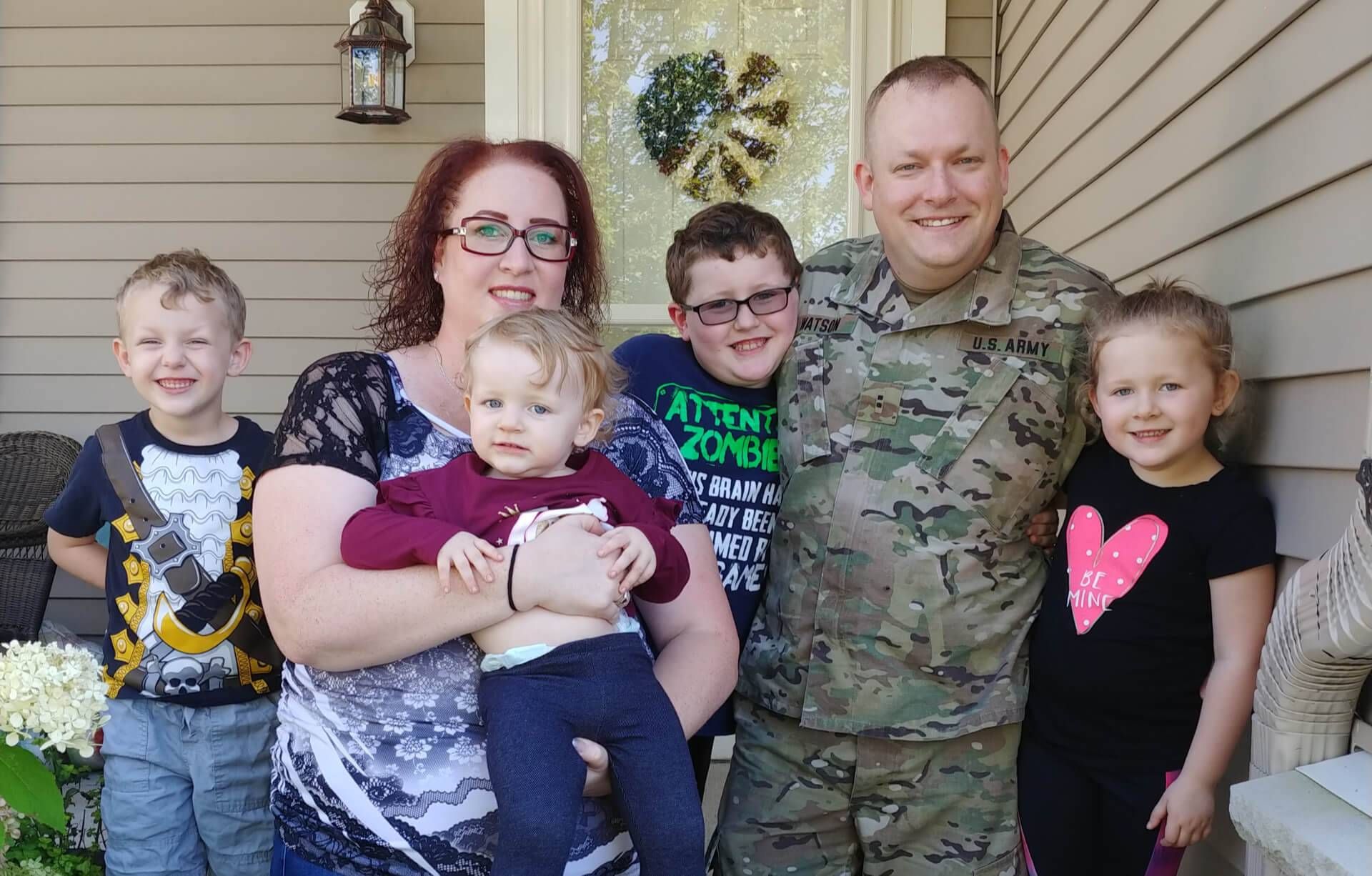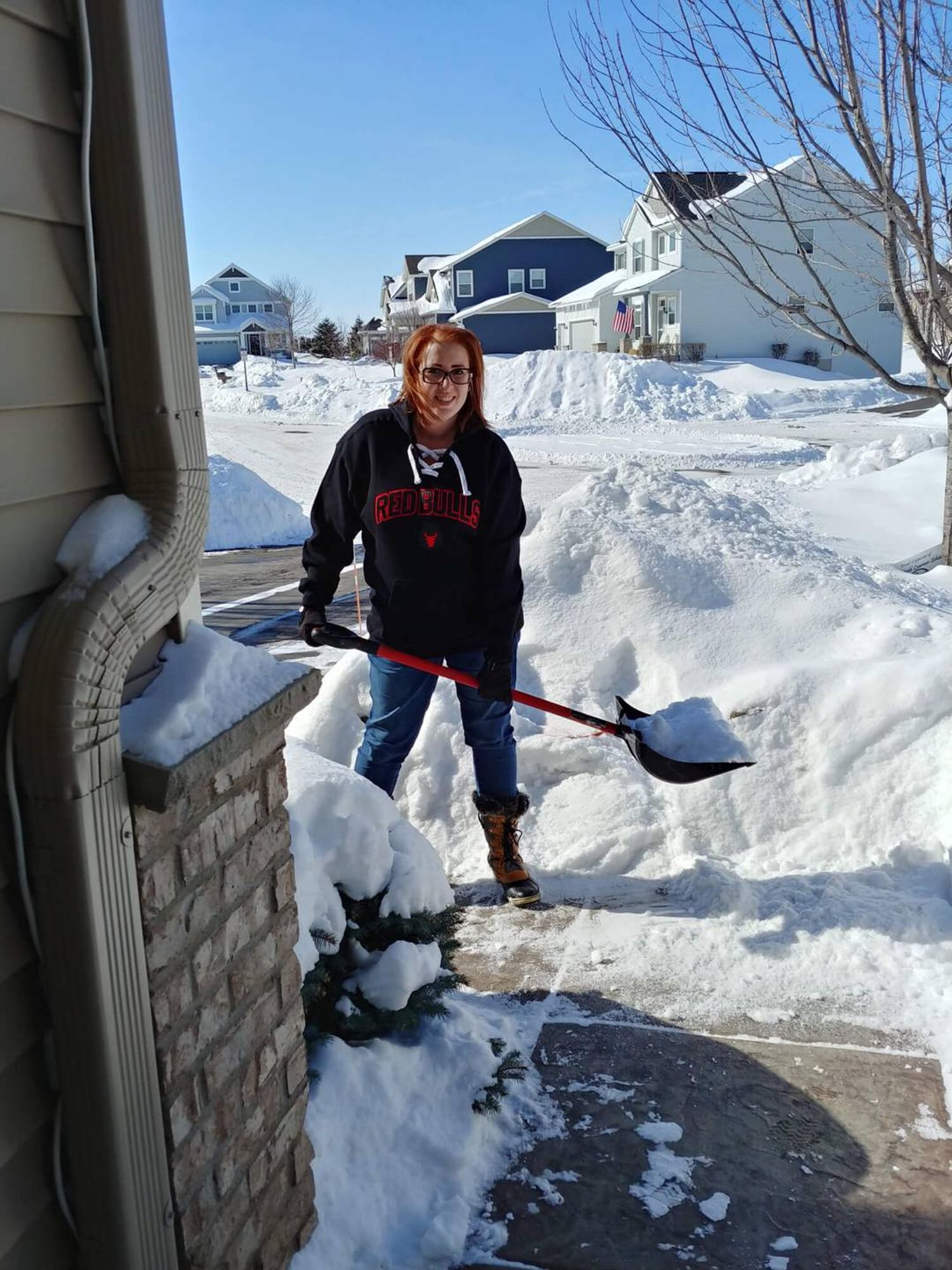Wonder what it's like for the family of a deployed soldier?
One Minnesota woman shares her firsthand perspective on juggling motherhood, household tasks, a brutal winter and broken appliances.
To set the stage: This deployment was not like my other experiences - but then, no two deployments are ever the same. At least this time we would be spoiled with the availability of communication, meaning we could talk with our soldiers as often as they are able. The only downside was the 8- and 9-hour time difference. I asked my husband to call every single day, but he laughed and said, "We’ll see," which is code for not likely. He did make sure to call four days each week, however.
My husband, Chief Warrant Officer Douglas Watson, has been in the Minnesota Army National Guard for 20 years, and he's been deployed three times. This is his fourth time overseas. We've been married for 13 years, together for 15 and have four children: Brody, 10; Brockton, 7; Evelyn, 5; and Elliana, 2. As a mom, I try to prepare both myself and my kids for the deployment and specifically for the the day Dad would leave. But of course, kids have no concept of time. So to make things easier, we used visuals such as calendars, a deployment wall with a map, pictures and a mailbox for the kids to send Dad all the school things. We used a jar of candy to count down the days until Dad’s return.

In my previous deployment experiences as a girlfriend, newlywed and mom of one young kiddo at home, I felt prepared to handle this experience. But sometimes life has different plans.
This deployment was different because, for the first time, I was experiencing it as a mom of four. I expected surprises, but nothing can truly prepare you for everything that will happen during a deployment. For example, I wasn't prepared for the flood of emotions the kids would go through, the extreme winter we would have or the number of appliances that would have problems.


During the first two to three weeks following the send-off day, I felt numb and sad. It almost felt like sending your kiddo off to summer camp. I knew we would be okay, that we just needed to get into a better routine, a new normal where mom does everything. Going out in public with little ones is a challenge for anyone, but going to a store with four kids by myself was a nightmare. I quickly learned to adapt - so while my husband was marching around with a rucksack, I was carrying our two-year-old on my back to ensure I had both hands ready and able in case my 5- and 6-year-olds decided to attempt a disappearing act in Costco. I felt like a pack mule.
However, if there's anything I've learned from previous deployments it's to stay busy, plan activities to look forward to, make friends going through this same deployment and to accept the help. My days would often begin at 6:30 am and wound end at 11 pm or midnight.
Deployments have a funny way of showing me just how resilient I can be. In a matter of three months my dishwasher broke after my son fell on the door. I temporarily fixed that, but then the dryer broke - so I bought a new one. Next up, the washing machine would not drain. What is a mom to do?
Thankfully, YouTube, a shop vac and a box full of tools to entertain a two-year-old came to my rescue: After a two-hour repair of the washing machine, I could add handy woman to my ever-evolving resume.
As the deployment winded down and we shifted gears to prepare for my husband’s return, the excitement and worry came back. As the candy in the jar started to disappear, marking Dad's impending return, the kids became increasingly wound up. I organized, tackled the mountain of laundry and mowed the lawn to perfection, not skipping the trimming like I usually do. After all, I wanted to make it seem as though a war did not take place in our home. Many military spouses like myself want our husbands to see that we took care of everything.
I didn’t want it to look like I struggled on a daily basis, but the reality is that I did. It's tempting to dump the kids and household responsibilities on your spouse and to take a much deserved break when your husband returns. But the reality is that if you push everything on your spouse it will only end in post-deployment arguments. The thing I learned from my last deployment is that there has to be a transition period: My husband will have no idea how to do the bedtime routine, how my daughters like their breakfast in the morning or which child has which daily chore. To ease the transition, my husband shadowed me for a week to help with the daily routine so he can start to help around the house while maintaining some sense of normalcy for the kids and our sanity. Over time, we will again adapt to a new normal; and for some, this can be done in three months and for others it can take a year or more. Military families are always adapting to change.
You cannot possibly prepare for everything that might go wrong, you can only educate yourself and learn from those around you about the resources or people at the ready to help you. A military family's biggest assets in a deployment are neighbors, a faith-based community, a group of friends and the larger military family community. I have a list of five things I will always need help with (childcare, meals, lawn/snow maintenance, heavy lifting or odd jobs and cleaning), so when someone asks me what they can do to help, I have an answer.
When those within the community ask how they can support military families, I always say, "See a need, fill a need." If a military family has a yard that has not been mowed in two weeks, just mow it. If their driveway is not cleared, clear it. When you have no other ideas or manual labor is not your forte, offer to watch their kids to give them a night off or simply bring them a meal. Lightening a military family's to-do list is the best help in the world!
This deployment has made me stronger: I survived 10 months as a single parent of four children and they are all alive and healthy! I made amazing friends that I hope will last the test of time. I learned my limits. My family will continue to change, but we are more resilient than we were a year ago. After all, I can now add handy woman, project manager and lawn care specialist to my ever-growing list of talents.
This story is part of our partnership with the Anoka County Historical Society - a collaboration that also produced the full-length documentary “We’re In This Together.”
Soldiers. Veterans. Families. Refugees. Military experiences have a lasting impact on those directly involved - and our collection "The Call to Serve: Stories of Sacrifice, War and the Way Home" captures a variety of perspectives from different conflicts.
Soon enough, we won't be able to listen in person to the stories of the men and women who put their lives at risk during World War II. Meet two trailblazing women who served in World War II.
More millennial women are taking on the role of "farmer-in-chief" of their family's agricultural operations - and just like Amy, they carry a heavy load of responsibility. One Greater Minnesota reporter Kaomi Goetz explores the rise of millennial women farmers in the state.
